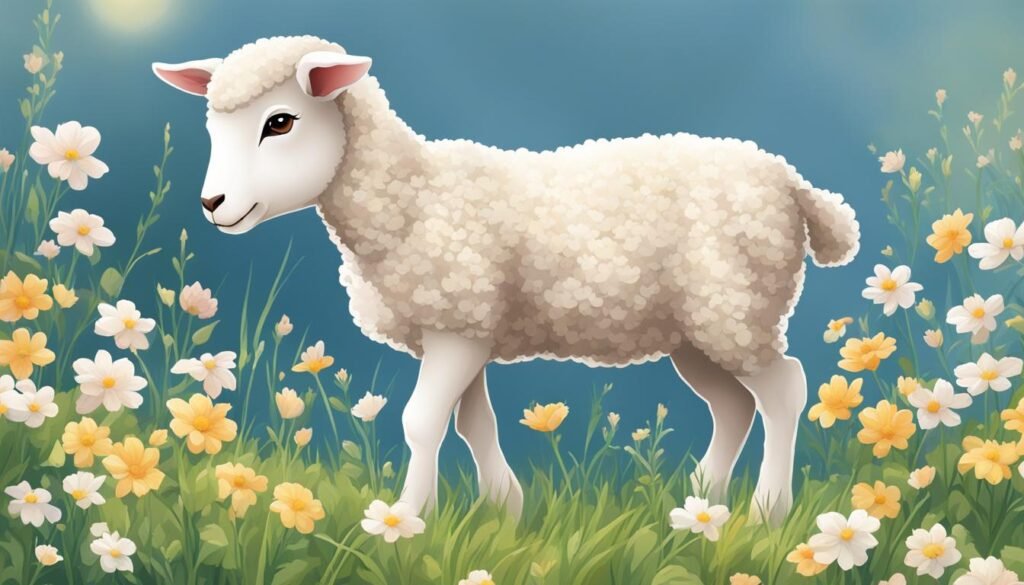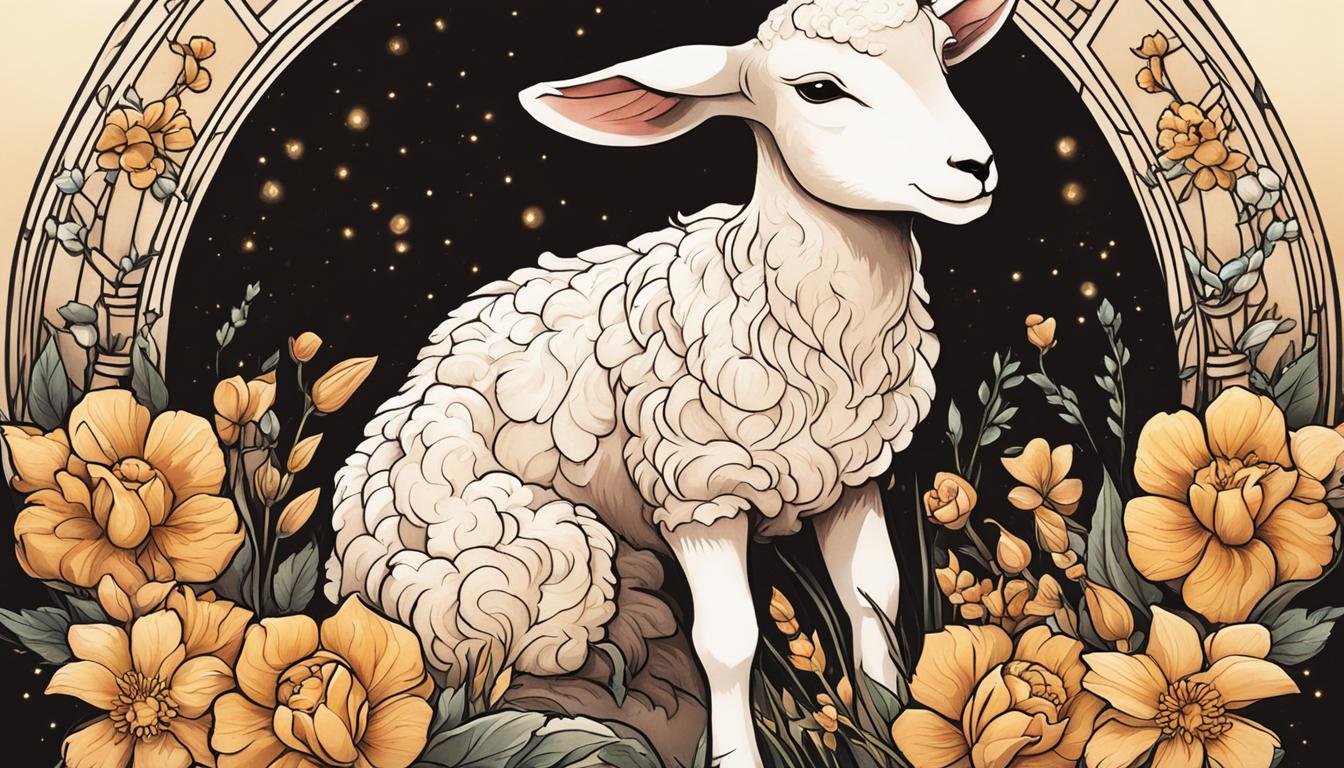Lamb tattoos have become increasingly popular in recent years, with many people opting to ink this symbolic creature onto their skin. However, it’s crucial to understand the deeper meaning behind a tattoo before permanently etching it onto your body. Lambs hold significant cultural and religious symbolism, representing qualities such as purity, innocence, sacrifice, and reverence. They are strongly associated with Christianity, serving as the ultimate symbol of Christ’s sacrifice. Yet, lamb tattoos can also hold personal meanings, reflecting patience, meekness, and spiritual purity.
When selecting a lamb tattoo, consider your beliefs, personality, and the message you wish to convey. Different designs and variations are available, ranging from playful cartoon sheep to realistic depictions and tribal-inspired artwork. By carefully choosing a lamb tattoo design that aligns with your own values and aspirations, you can ensure that your tattoo holds deep personal significance.
Key Takeaways:
- Lamb tattoos carry cultural and religious symbolism, representing qualities like purity, innocence, sacrifice, and reverence.
- In Christianity, lambs are seen as the ultimate symbol of Christ’s sacrifice and are referred to as the “Lamb of God.”
- Personal interpretations of lamb tattoos can include qualities such as patience, meekness, and spiritual purity.
- Choose a lamb tattoo design that aligns with your beliefs, personality, and the message you wish to convey.
- Popular variations of lamb tattoos include cartoon sheep, realistic depictions, and tribal-inspired designs.
The Symbolism of Lambs
Lambs hold deep symbolism in various cultural and religious contexts. In Christianity, lambs are often associated with purity and innocence, representing the ultimate sacrifice of Jesus Christ. They are referred to as the “Lamb of God” and symbolize humility, forgiveness, and sweetness. Lambs also hold cultural significance, embodying qualities such as meekness and reverence.
In early Christianity, lambs were depicted alongside lions as symbols of paradise. The image of a lamb with a halo represents spiritual purity and is commonly seen in religious art and iconography. Additionally, black lambs have their own symbolism. They are believed to bring luck when there is one in a flock, symbolizing sacrifice and good fortune. However, if a flock has multiple black lambs, it is seen as a sign of bad luck.
Religious Symbolism of Lambs
In Christianity, lambs are highly revered and symbolize the purity and innocence of Jesus Christ. The concept of the Lamb of God stems from the idea of Jesus being the sacrificial lamb who took on the sins of the world. It is a powerful symbol of selflessness and redemption.

Overall, lambs hold great significance in both religious and cultural contexts, representing qualities of purity, innocence, sacrifice, and luck. Understanding the symbolism of lambs can help individuals make meaningful choices when it comes to getting a lamb tattoo.
Meanings and Designs of Lamb Tattoos
Lamb tattoos are not just a fashion statement, but a powerful symbol that holds deep meaning and significance. These tattoos can convey various messages, from religious devotion to personal values and beliefs.
One popular design for lamb tattoos is the cartoon sheep, which brings a sense of playfulness and whimsy. It represents the lightheartedness of childhood and the innocence associated with lambs. For those who identify as rebellious or unique, the black sheep tattoo is a perfect choice. It symbolizes standing out from the crowd and embracing one’s individuality.
If you’re an animal lover, you may opt for a realistic lamb tattoo. This design showcases the beauty and grace of the animal, honoring its natural qualities. On the other hand, tribal lamb tattoos are favored by those with a spiritual connection to the animal or an interest in tribal art. These intricate designs often incorporate elements of nature and are a way to express a deeper connection with the world around us.
Ultimately, the meaning of a lamb tattoo is highly personal. It can represent purity, innocence, patience, or sacrifice. For religious individuals, it may symbolize their faith or honor their zodiac sign. Whatever your reason for choosing a lamb tattoo, it’s important to consider your beliefs, style, and the message you want to convey. Your tattoo will be a lifelong reminder of what’s important to you.
FAQ
What is the meaning of a lamb tattoo?
Lamb tattoos hold deep cultural and religious symbolism, representing qualities such as purity, innocence, sacrifice, and reverence. They are often associated with Christianity and are considered the ultimate symbol of Christ’s sacrifice. However, lamb tattoos can also have personal meanings, such as representing patience, meekness, and spiritual purity.
What do lambs symbolize in Christianity?
In Christianity, lambs symbolize purity and innocence, representing Christ’s sacrifice. They are often referred to as the “Lamb of God.” Lambs also hold cultural significance and are associated with qualities such as humility, forgiveness, and sweetness.
What is the significance of black lambs?
Black lambs are symbols of sacrifice and are believed to bring luck when there is one in a flock. However, if a flock has multiple black lambs, it is seen as a sign of bad luck.
Why do people get lamb tattoos?
People choose lamb tattoos for various reasons. Some find sheep and lambs cute and get the tattoos for aesthetic purposes. Others may get them to represent qualities like purity, innocence, patience, or sacrifice. Religious individuals may opt for lamb tattoos to symbolize their faith or to honor their zodiac sign, as sheep/goat is one of the Chinese zodiac signs.
What are some popular lamb tattoo designs?
Popular lamb tattoo designs include cartoon sheep, which represent playfulness and childhood innocence, black sheep tattoos for those who identify as rebellious or unique, realistic lamb tattoos for animal lovers, and tribal lamb tattoos for those with a spiritual connection to the animal or an interest in tribal art.

